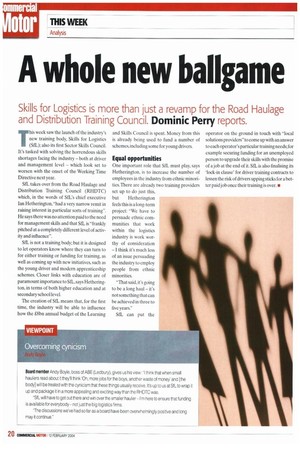A whole new ballgame
Page 20

If you've noticed an error in this article please click here to report it so we can fix it.
Skills for Logistics is more than just a revamp for the Road Haulage and Distribution Training Council. Dominic Perry reports.
This week saw the launch of the industry's new training body. Skills for Logistics (SfL); also its first Sector Skills Council. It's tasked with solving the horrendous skills shortages facing the industry — both at driver and management level — which look set to worsen with the onset of the Working Time Directive next year.
SfL takes over from the Road Haulage and Distribution Training Council (RHDTC) which, in the words of SfL's chief executive Ian Hetherington, "had a very narrow remit in raising interest in particular sorts of training". He says there was no attention paid to the need for management skills and that SfL is "frankly pitched at a completely different level of activity and influence".
SfL is not a training body; but it is designed to let operators know where they can turn to for either training or funding for training, as well as coming up with new initiatives, such as the young driver and modern apprenticeship schemes. Closer links with education are of paramount importance to SfL, says Hetherington. in terms of both higher education and at secondary school level.
The creation of SfL means that, for the first time, the industry will be able to influence how the £8bn annual budget of the Learning and Skills Council is spent. Money from this is already being used to fund a number of schemes. including some for young drivers.
Equal opportunities
One important role that SfL must play, says Hetherington, is to increase the number of employees in the industry from ethnic minorities. There are already two training providers set up to do just this, but Hetherington feels this is a long-term project: "We have to persuade ethnic communities that work within the logistics industry is work worthy of consideration —I think it's much less of an issue persuading the industry to employ people from ethnic minorities.
"That said, it's going to be a long haul — it's not something that can be achieved in three to five years."
SfL can put the operator on the ground in touch with "local solutions providers" to come up with an answer to each operator's particular training needs; for example securing funding for an unemployed person to upgrade their skills with the promise of a job at the end of it. SfL is also finalising its 'lock-in clause' for driver training contracts to lessen the risk of drivers upping sticks for a better paid job once their training is over. •






























































































































































































